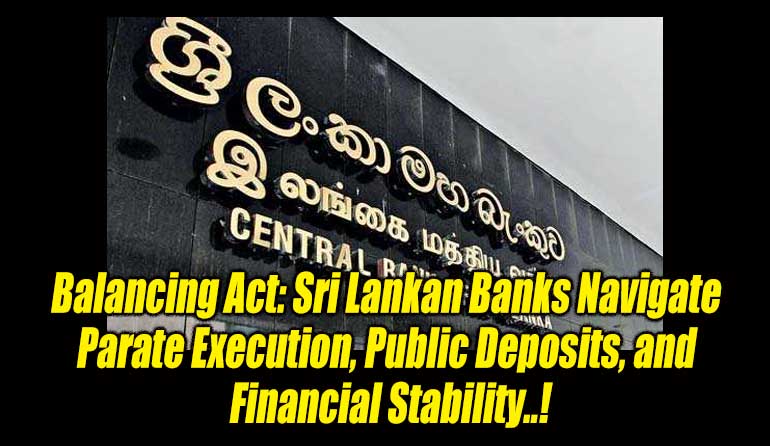-By A Special Correspondent

(Lanka-e-News -02.Jan.2024, 10.40 PM) In a nation grappling with economic complexities, the spotlight is now on Sri Lanka's banking sector as it faces a critical dilemma - the prioritization of parate execution over the stability of the financial system and the commercial banks' license to sell securities for loan recovery. This investigation explores the implications of this contentious issue and the far-reaching consequences on millions of struggling individuals, large corporations, and the broader economy.
Sri Lankan banks have come under scrutiny for their perceived harshness towards millions of individuals struggling to repay loans, while billions in unsecured loans to large corporations remain unrecovered. Shockingly, it has been revealed that substantial loans, amounting to $500 million, extended to Maldivian businesses and defaults from over 56 Indian companies to Sri Lankan banks have never been disclosed by the CENTRAL BANK.
In response to these challenges, the Honorable Justice Minister, drawing from his legal expertise and past banking experience, is considering amending the law. His understanding of the practical difficulties faced by borrowers adds a human touch to the debate, emphasizing the need for a balanced approach to protect both creditors and debtors.
The Central Bank, led by Governor Dr. Nandalal Weerasinghe, recently asserted that the right of parate execution should not be amended in favor of what he deems as an "insignificant number of loud debt evaders." Dr. Weerasinghe argues that parate execution is crucial for safeguarding the public's deposits, as loans for various industries are funded from the general public's deposits. He maintains that when someone evades debt, the depositors primarily bear the loss.
Despite the Central Bank's firm stance, the article highlights that parate measures were implemented against only 557 individuals in the first 11 months of the year. Dr. Weerasinghe provides a numerical breakdown, stating that the recovered amount, Rs.38 billion, constitutes only 0.4 percent of the overall credit disbursed by the banking sector. He further underscores that it represents a mere 2.7 percent of the Stage 3 impaired loans.
With Rs.16 trillion in deposits from the general public forming 81 percent of the overall banking system liabilities, Dr. Weerasinghe emphasizes the unfairness of forgiving or providing relief to debt evaders at the expense of depositors. He urges depositors to organize and actively safeguard their savings, highlighting the crucial role they play in ensuring the stability of the banking sector.
The article concludes with Dr. Weerasinghe's call for depositors to be proactive in protecting their savings, asserting that waiting until financial institutions collapse is not an effective strategy. He urges the public to reflect on whether banks should provide debt relief to evaders at the potential expense of taxpayers and depositors.
In a nation at the crossroads of economic decisions, the debate over parate execution unfolds as a complex narrative, intertwining the interests of debtors, creditors, and the stability of Sri Lanka's financial landscape.
---------------------------
by (2024-01-02 18:24:58)
Leave a Reply